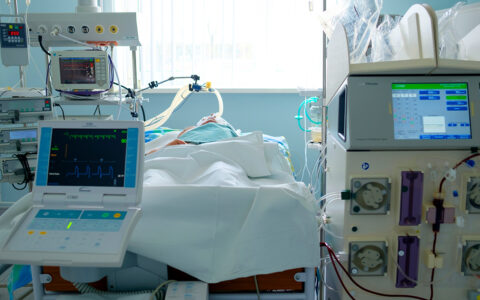How genetic screening results may impact individual health-care decisions — in the short run and over a lifetime — remains unclear, despite the tests’ increasing availability and access.
However, a new study led by researchers at Vanderbilt University Medical Center and published in the American Journal of Human Genetics reports that fewer than half of tested adults followed up on their results by accessing health care services, even when those findings were actionable.
“Approximately half of participants receiving pathogenic or likely pathogenic results did not receive a qualifying health-care service related to the monogenic risk,” said Josh Peterson, M.D., M.P.H., a professor of biomedical informatics and medicine at Vanderbilt.
“To improve outcomes after receiving genetic screening results, patients at increased risk should receive follow-up health services.”
The organization behind the study, the Electronic Medical Records and Genomics Network, or eMERGE, conducts research to guide the implementation of genomic medicine. The national consortium is organized and supported by the National Human Genome Research Institute, part of the National Institutes of Health.
Since eMERGE started in 2007, VUMC has served as both a network site and as its national coordinating center. The prospective study was co-led by Peterson and Jodell Jackson, Ph.D., operations director for the network.
Multi-Center Study
The researchers’ study involved the genotyping of 16,218 research participants at 10 sites around the country.
Genetic counselors at six of the sites informed 477 of the participants that they were carrying pathogenic or likely pathogenic variants for one of five diseases and/or conditions: arrhythmia, breast cancer, cardiomyopathy, colorectal cancer, or familial hypercholesterolemia.
The team matched the 477 adult participants with risk factors to 477 participants who were negative for the concerning variants. For 12 months before and 12 months after the genetic testing results were returned, the investigators searched EHRs to track use of 73 different diagnostic tests and interventions.
Key Results
Over the 12 months prior to receiving their genetic results, about a quarter of both groups had received one or more of the tracked tests and procedures, with costs to insurers averaging around $160 per patient during that period.
“About half did not receive further testing or services, even after receiving actionable results.”
For participants who received no concerning genetic results, the frequency of obtaining these services remained unchanged in the months before and after the results were returned.
Among participants who received counseling for risk variants, use of one or more of the health-care services in question increased from 26 percent to 44 percent, with average costs to insurers months rising from $162 to $343 over the 12-month period.
“We are seeing measurable differences in health care after return of these genomic results, both in cost and services,” Jackson said. “While about half did not receive further testing or services, even after receiving actionable results, they may have previously known about and previously addressed their risks, preferred not to make changes to their health care, or were unable to afford follow-up.”
Future Directions
As costs for genetic screening fall and prevention strategies improve, Peterson expects most adults will be routinely screened for a panel of genetic diseases similar to those measured for this study.
“Our results show the near-term incremental cost for screening for these conditions is likely to be modest,” Peterson said. “It’s also clear we’ll need systems and policies in place to help providers and patients manage these risks to improve follow-up care rates.”
Future investigations will not only use single-gene risk scores but also incorporate polygenic risk scores and more in-depth information about medical history, he added.
Adapted from an article in the Vanderbilt Reporter.





